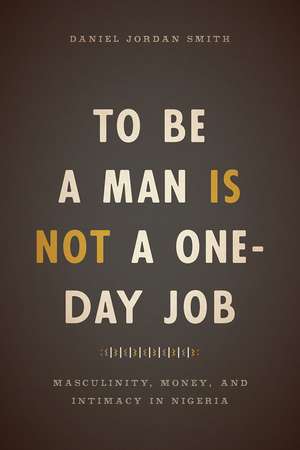To Be a Man Is Not a One-Day Job: Masculinity, Money, and Intimacy in Nigeria
Autor Daniel Jordan Smithen Limba Engleză Paperback – 24 noi 2017
Refrains about financial hardship are ubiquitous in contemporary Nigeria, frequently expressed through the idiom “to be a man is not a one-day job.” But while men talk constantly about money, underlying their economic worries are broader concerns about the shifting meanings of masculinity, amid changing expectations and practices of intimacy.
Drawing on twenty-five years of experience in southeastern Nigeria, Daniel Jordan Smith takes readers through the principal phases and arenas of men’s lives: the transition to adulthood; searching for work and making a living; courtship, marriage, and fatherhood; fraternal and political relationships; and finally, the attainment of elder status and death. He relates men’s struggles both to fulfill their own aspirations and to meet society’s expectations. He also considers men who behave badly, mistreat their wives and children, or resort to crime and violence. All of these men face similar challenges as they navigate the complex geometry of money and intimacy. Unraveling these connections, Smith argues, provides us with a deeper understanding of both masculinity and society in Nigeria.
Drawing on twenty-five years of experience in southeastern Nigeria, Daniel Jordan Smith takes readers through the principal phases and arenas of men’s lives: the transition to adulthood; searching for work and making a living; courtship, marriage, and fatherhood; fraternal and political relationships; and finally, the attainment of elder status and death. He relates men’s struggles both to fulfill their own aspirations and to meet society’s expectations. He also considers men who behave badly, mistreat their wives and children, or resort to crime and violence. All of these men face similar challenges as they navigate the complex geometry of money and intimacy. Unraveling these connections, Smith argues, provides us with a deeper understanding of both masculinity and society in Nigeria.
Preț: 152.10 lei
Preț vechi: 185.07 lei
-18% Nou
Puncte Express: 228
Preț estimativ în valută:
29.11€ • 30.07$ • 24.23£
29.11€ • 30.07$ • 24.23£
Carte indisponibilă temporar
Doresc să fiu notificat când acest titlu va fi disponibil:
Se trimite...
Preluare comenzi: 021 569.72.76
Specificații
ISBN-13: 9780226491653
ISBN-10: 022649165X
Pagini: 272
Ilustrații: 12 halftones
Dimensiuni: 152 x 229 x 20 mm
Greutate: 0.4 kg
Ediția:1
Editura: University of Chicago Press
Colecția University of Chicago Press
ISBN-10: 022649165X
Pagini: 272
Ilustrații: 12 halftones
Dimensiuni: 152 x 229 x 20 mm
Greutate: 0.4 kg
Ediția:1
Editura: University of Chicago Press
Colecția University of Chicago Press
Notă biografică
Daniel Jordan Smith is professor of anthropology at Brown University. His previous books include AIDS Doesn’t Show Its Face, also published by the University of Chicago Press.
Cuprins
Introduction
1 From Boys to Men: Learning to Love Women and Money
2 Expensive Intimacies: Courtship, Marriage, and Fatherhood
3 “Money Problem”: Work, Class, Consumption, and Men’s Social Status
4 “Ahhheee Club”: Money, Intimacy, and Male Peer Groups
5 Masculinity Gone Awry: Intimate Partner Violence, Crime, and Insecurity
6 Becoming an Elder, Burying One’s Father
Conclusion
Acknowledgments
Notes
Bibliography
Index
1 From Boys to Men: Learning to Love Women and Money
2 Expensive Intimacies: Courtship, Marriage, and Fatherhood
3 “Money Problem”: Work, Class, Consumption, and Men’s Social Status
4 “Ahhheee Club”: Money, Intimacy, and Male Peer Groups
5 Masculinity Gone Awry: Intimate Partner Violence, Crime, and Insecurity
6 Becoming an Elder, Burying One’s Father
Conclusion
Acknowledgments
Notes
Bibliography
Index
Recenzii
“In this brilliant and highly readable exploration of masculinity, Smith bores down into the lives of his Nigerian friends and informants to find out what makes them tick. Through his interest in and involvement with a local tennis club for a period of over twenty-five years, he has developed a depth of understanding that even for anthropologists is unusual. Couched within a national context where corruption is rife and living precarious, Smith’s narrative shows how men respond to the challenges they face. If Arlie Hochschild brought the burden of working women to the attention of the world in her book SecondShift, Smith brings to the fore the arduous lives of African men with To Be a Man Is Not a One-Day Job.”
“‘Money makes the man’, say Nigerians. In this vivid and gripping ethnography, Smith shows how true this adage is. He reveals the ambiguous and contradictory ways in which money seems at once to enable and to undermine the forms of sociality and intimacy on which the successful enactment of masculinity depends in Nigeria. Brimming with insightful observations and telling details, this book makes an outstanding contribution to our understanding of a topic of enormous contemporary significance—in Africa and beyond.”
